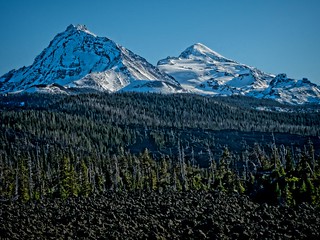
(Photo: Mary Harrsch)
Good morning! Our roundup of the best bike links on the web this week is sponsored by Western Bike Works, longtime BikePortland sponsor and one of the city’s best bike shops.
Peaceful mountains: McKenzie Pass, between the Sisters, is car-free but open to bikes until at least June 16.
Crosswalk ban: A group of Tacoma activists, 15 of whom have personally been hit by cars, have been painting crosswalks without permission “to get the attention of the city.” It worked! The city is now threatening to prosecute rogue crosswalk painters.
Lucky growth: Portland’s urban growth boundary attempted to halt in-migration but ended up creating precious infill. That’s one insight from a fascinating Oregonian interview with urbanist author Benjamin Ross, who speaks at Powell’s tonight.
Safer stop law: In Boise, where the Idaho Stop law lets people on bikes at red lights start pedaling before a green, bikers are 30 percent safer than their peers in Sacramento, Calif.. Maybe that’s because the law “allows cyclists to choose the safest time to cross the street.”
The scofflaw myth: British writer Helen Blackman has a great breakdown of the “othering” process that leads people to see bike users as lawless while tolerating car users who break laws.
Quiet wounds: Seven years after she was nearly killed while walking across the old, auto-centric Times Square, the executive editor of the New York Times still walks with a limp and recalls her crash every time she sees a white delivery truck.
Faded phosphorescence: Remember those glow-in-the-dark Dutch roads we shared in the Roundup a few weeks back? BikePortland reader GlowBoy called it: They faded.
Afghan racers: The Afghan women’s cycling team is breaking some gender barriers, but its 25-year old assistant coach still rides in full-length workout togs on the hottest days, with her husband cheering. NPR has audio.
Universal access: When Antwerp’s city council asked residents to avoid biking on one of the city’s busiest roads, more than 1,000 residents took the streets in protest.
Freeway tolls: It’s time to repeal the federal law against tolling Interstate freeways, President Obama says. Mysteriously, McDonald’s and Dunkin’ Donuts disagree.
Transportation bill: The League of American Bicyclists has a first-rate summary of Obama’s transportation proposal as it relates to biking.
Biking’s patron: Former U.S. Rep. Jim Oberstar, D-Minn., “perhaps cycling’s greatest supporter in congressional history,” died in his sleep Saturday. He was 79.
Skewed data: Oregon’s experiment with using Strava’s athlete-oriented biking data to inform policy decisions is “like buying customer data from Whole Foods and using it to understand the grocery shopping behaviors of everyone in the city,” argues Chicago writer Echo.
Return on investment: Spending the next 40 years adding “physical separation on main roads and bicycle-friendly speed reduction on local streets” would greatly boost biking rates and thus “yield benefits 10–25 times greater than costs,” a New Zealand study just concluded.
Ungreen manufacturing: Bike maker Specialized ran the numbers on the amount of energy and water consumed to make their bikes. It’s a lot (though probably a lot less than a car).
“The perfect crime”: If you kill a person with your car in NYC (as in Oregon), the Freakonomics podcast explains, you’ll probably get off free, in part because you’re simultaneously eliminating a key witness.
CRC reboot: Oregon legislators who are skeptical of freeway projects are notably absent from Washington Republicans’ invite list to a proposed summit that would start from scratch on a rail-free Interstate 5 bridge replacement.
Chicago bike share: Chicago’s huge bike sharing system has found a lead sponsor: Blue Cross and Blue Shield of Illinois, which just offered $12.5 million to get its logos on the 3,000 bikes for the next five years. (For comparison, Portland is counting on a total of $5.5 million from private sponsors over the first five years of a system it would launch with 750 bikes, and Seattle is getting $2.5 million for the first five years of its 500-bike system from its lead sponsor, Alaska Airlines.)
If you’ve been waiting for the day when your tall bike is going to show them — show them all! — you need to check out your video of the week, via Gawker:
If you come across a noteworthy bicycle story, send it in via email, Tweet @bikeportland, or whatever else and we’ll consider adding it to next Monday’s roundup.

